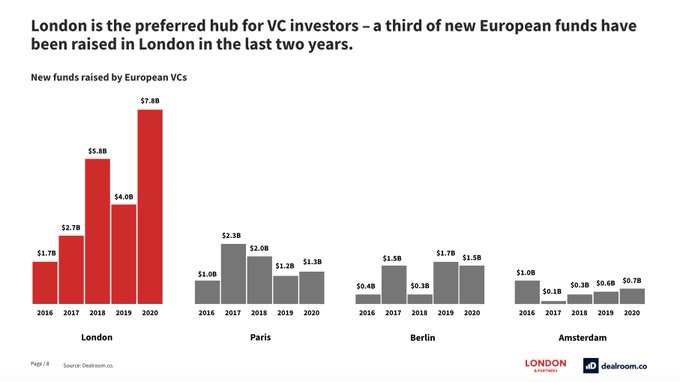
In the midst of Brexit plans and a Covid pandemic, the UK Government launched a FinTech review chaired by Ron Kalifa.
I’ve met Ron at a few conferences, when he was CEO and then Chairman of WorldPay and will find it interesting to see what he finds.
“The intention of this review is to establish priority areas for industry, policy makers, and regulators to explore in order to support the ongoing success of the UK fintech sector.”
OK, good.
First and foremost, with Brexit proving to be onerous for all in terms of form filling and taxes, it is clear that there is an issue around talent and movement of people. We no longer have access to Europe and vice versa. It may not feel that way, but that’s the way it is. What this means in practice is that the UK and London in particular could lose out when it comes to founding future FinTech firms.
It’s not the case today – in 2020, London tech firms raised $10.5 billion ...
… but the question is whether that will continue through the rest of this century. A century is a long time and if the ability to hire the right people is blocked, there is an issue.
The review must look at how to ensure open borders for talent, even in a closed border world.
Another issue is that the current regulations around Open Banking are not allowing real competition between traditional banks and Fintech challengers. The way it was constructed is that incumbents still have the advantage and challengers struggle to compete, particularly if the rules mean that customers are discouraged from data sharing, as seems to be the way right now.
Open Banking is here, but it’s not a reality. The review needs to make it a reality.
There is a rumour that Ron will recommend that Rishi Sunak creates a £1 billion investment fund to fuel FinTech start-up growth – an industry estimated to be worth £7 billion to the UK economy and one that employs 60,000 people. What would the £1 billion be used for? To give tax incentives and funding to start-ups that start up in London and the UK? Not sure that Sunak will go for it in current climate of everyone needing a buck or two but … you never know.
After all, Sunak is committed to Big Bang 2.0 – a regeneration of banking and finance in Britain that should build upon the first Big Bang created by Margaret Thatcher in 1986. That first Big Bang created a $200 billion industry employing a million people in Britain, and supplanted the coal, manufacturing and other industrial era businesses. Can Britain keep that momentum?
I’m not sure. There are so many uncertainties today that the only certainty is uncertainty. But then, we’ve had that uncertain world for decades. When the first Big Bang occurred, everyone believed Frankfurt would become Europe’s financial centre and London would die. It didn’t happen. In 2021, with Brexit and Covid, will London, the UK and FinTech create a resurgence that, by 2040 and beyond, means that Britain will have a trillion dollar business with millions of people?
Maybe.
Maybe the UK will start to create bridging regulations – or, as some call it, regulatory arbitrage – between America and Europe. A MiFIDII that’s actually a MiFIDII.5; a Solvency2 that’s actually a Solvency2.3; and so on and so forth.
In other words, the Singapore-on-the-Thames.
Oh no! How dare you say what cannot be said, Chris!!!
Well, there you go, I’ve said it.
Addressing concerns about the future prosperity of the Square Mile, John Glen [Economic Secretary to the Treasury and City Minister] denied that rules in the financial hub would be relaxed to improve competition, insisting that its reputation relied on its regulatory regime. Glen shrugged off concerns that rule changes would transform the City into a so-called Singapore-on-Thames, adding that it was not “seeking to wilfully diverge in every area for the sake of short-term presentational gain”.
Yep and blah, blah, blah, yada, yada, yada.
The Kalifa Review is expected to submit its report to the UK Treasury this month. I will be interested to see what it says but don’t be surprised if the underlying theme is that we want the UK to be a Singapore-on-the-Thames.
Chris M Skinner
Chris Skinner is best known as an independent commentator on the financial markets through his blog, TheFinanser.com, as author of the bestselling book Digital Bank, and Chair of the European networking forum the Financial Services Club. He has been voted one of the most influential people in banking by The Financial Brand (as well as one of the best blogs), a FinTech Titan (Next Bank), one of the Fintech Leaders you need to follow (City AM, Deluxe and Jax Finance), as well as one of the Top 40 most influential people in financial technology by the Wall Street Journal's Financial News. To learn more click here...


